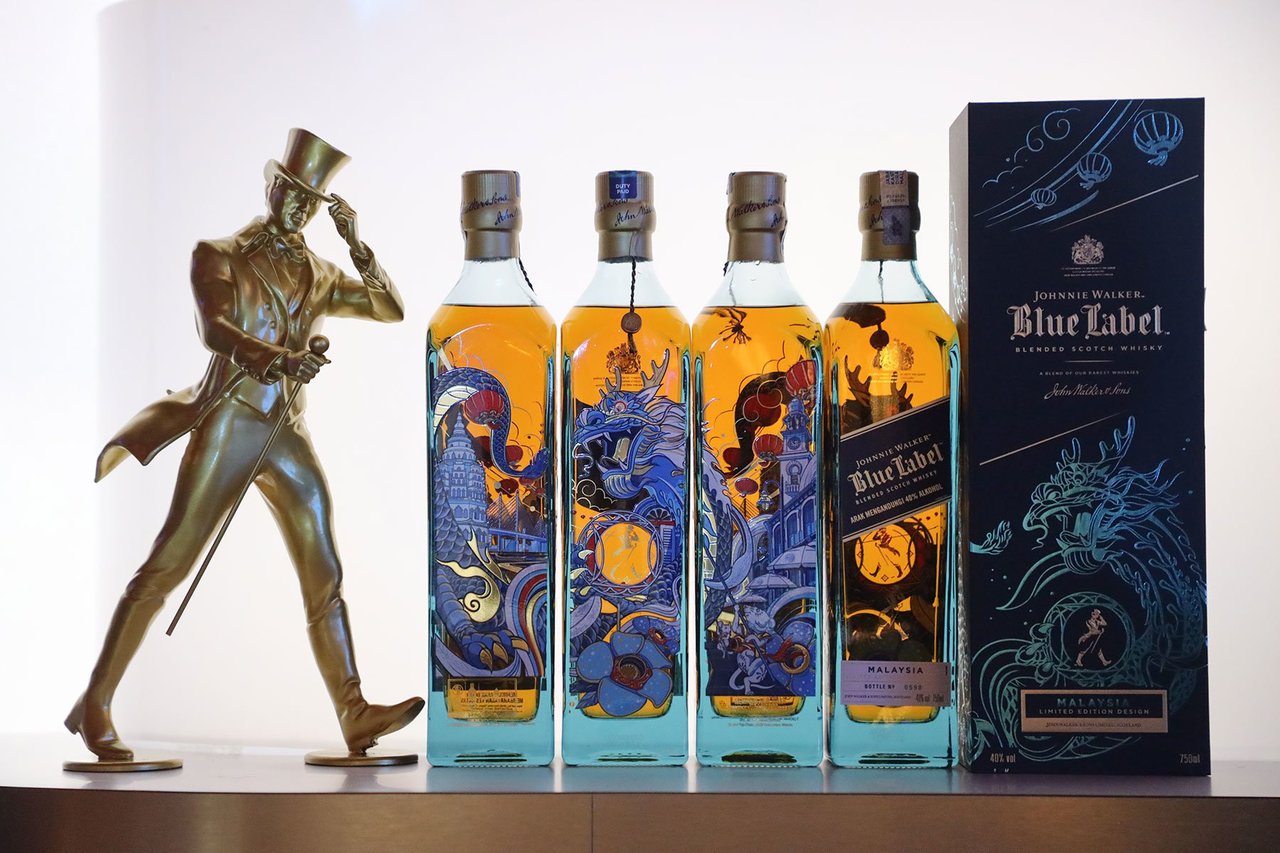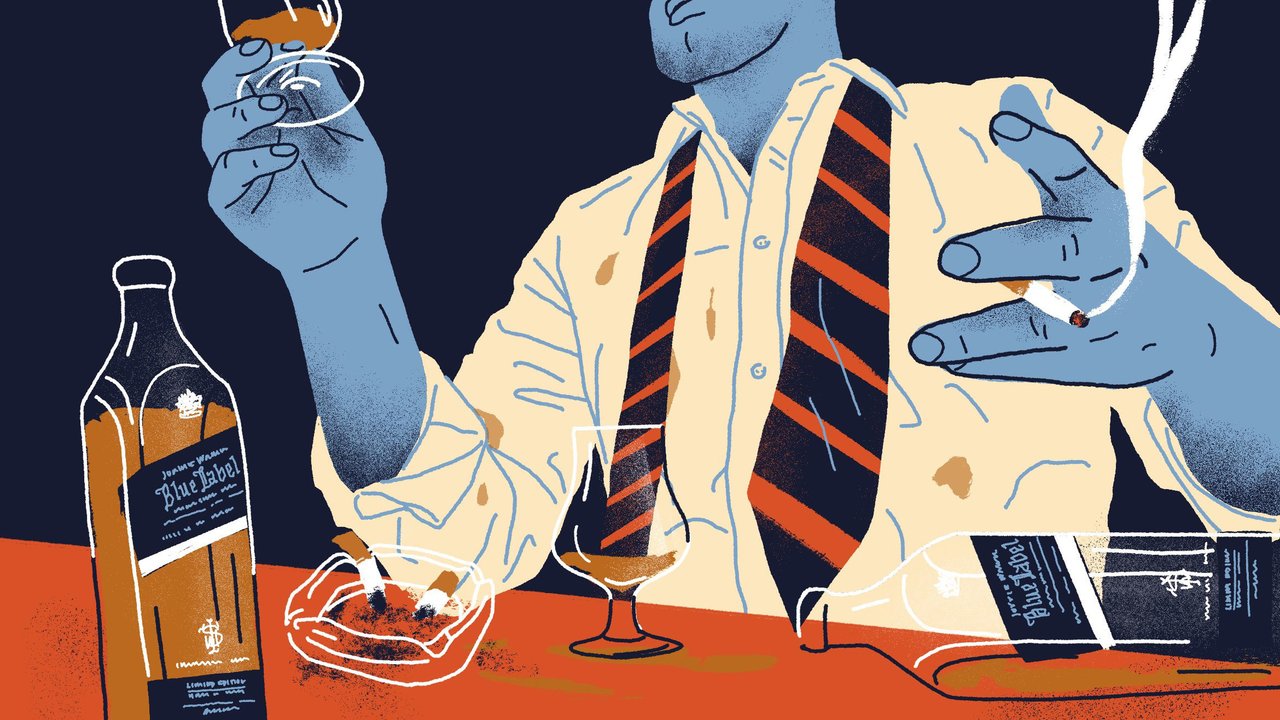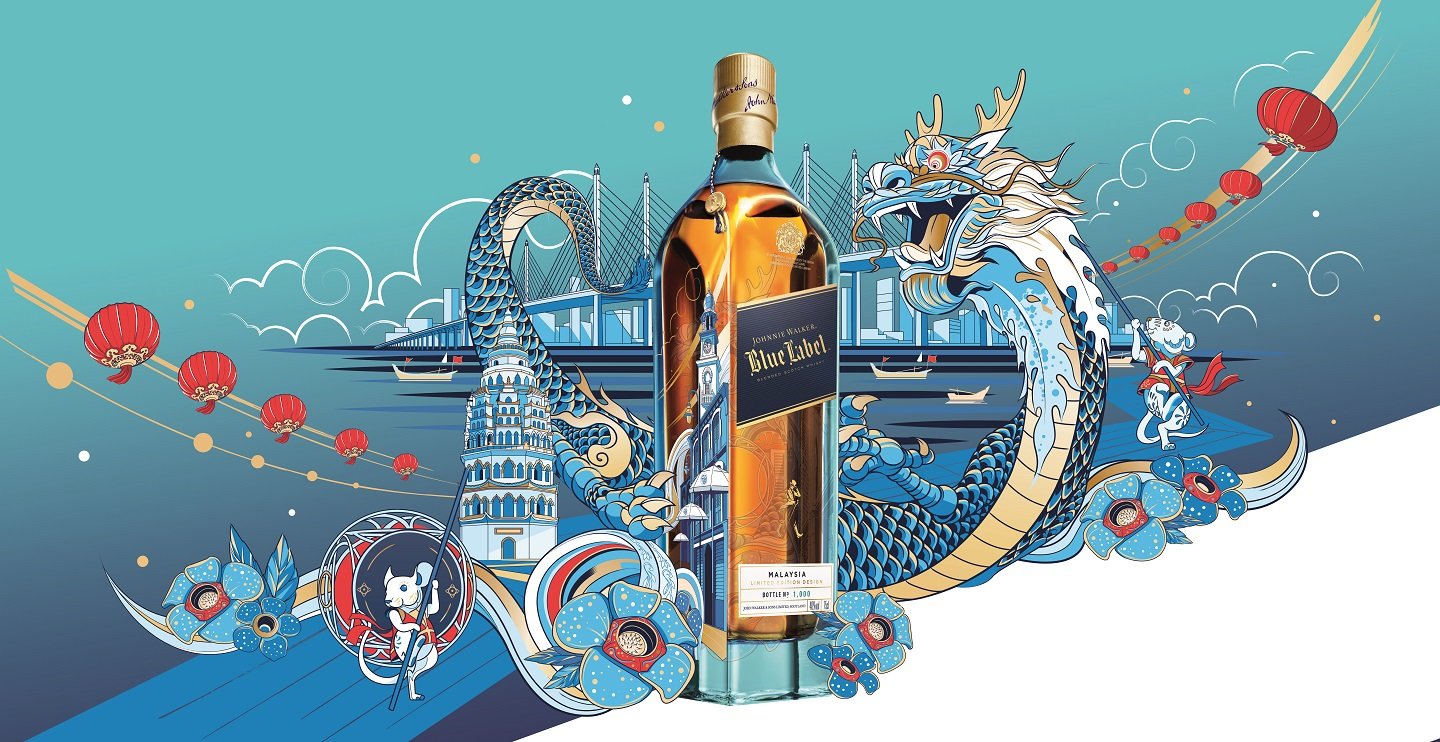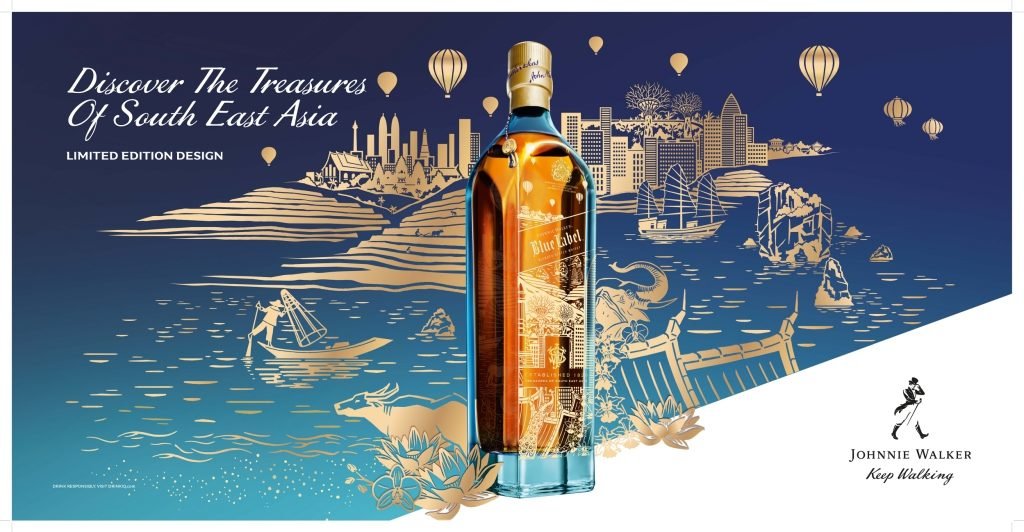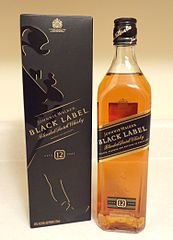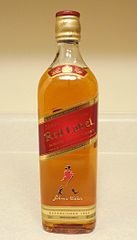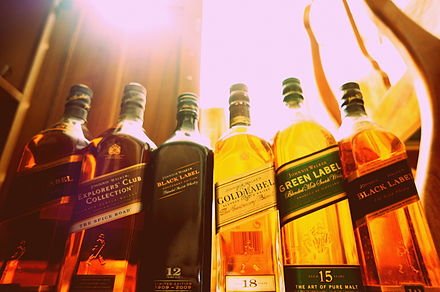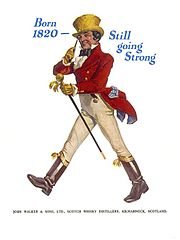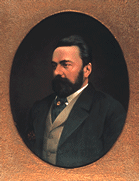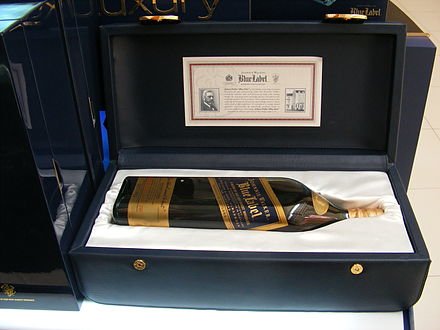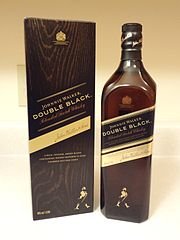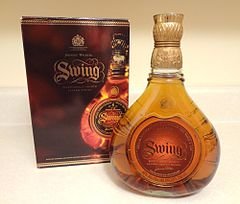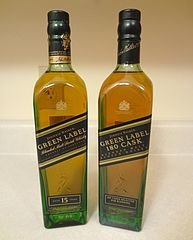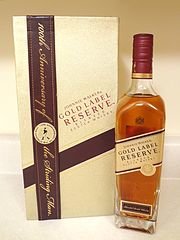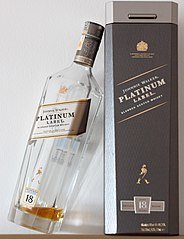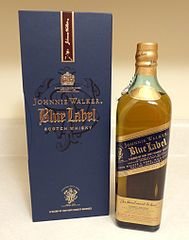British Heritage
Remember, Cherish, Learn.
beta
Johnnie Walker - The World's Best-Selling Scotch Whisky
A Celebrated Legacy in British Heritage.
Johnnie Walker, a brand synonymous with Scotch whisky, is an integral part of Britain's cultural and historical tapestry. Originating in the humble town of Kilmarnock in East Ayrshire, Scotland, the brand has left an indelible mark on the spirits industry and British heritage. Known for its superior blends and iconic square bottle, Johnnie Walker is more than a brand; it's a testament to entrepreneurial spirit, quality, and timeless tradition.
The narrative of Johnnie Walker begins with its namesake, John Walker, born on 25 July 1805. Following the demise of his farmer father in 1819, Walker took over the family's grocery, wine, and spirits business on Kilmarnock's High Street. The Excise Act of 1823 marked a turning point for Walker's business, liberalising laws on whisky distillation and reducing taxation, allowing him to extend his offering to spirits such as rum, brandy, gin, and whisky.
By the mid-1820s, Walker had shifted his focus predominantly to whisky, establishing a reputation for blending whiskies tailored to customer tastes, despite the absence of a brand of his own at the time. His blend, known as Walker's Kilmarnock Whisky, laid the foundation for the Johnnie Walker brand, which rose to popularity in the years following his death in 1857.
Johnnie Walker's legacy was perpetuated by Walker's descendants, particularly his son Alexander Walker and grandson Alexander Walker II, who significantly expanded the brand. They capitalised on the Spirits Act of 1860, which legalised the blending of grain whiskies with malt whiskies, revolutionising the whisky industry. Alexander Walker was responsible for the introduction of the brand's signature square bottle in 1860, which maximised storage space and minimised breakage, while the angled label, applied at 24 degrees upwards, became another defining feature.
Under Alexander Walker's leadership, whisky sales soared, representing up to 95 percent of the firm's income by the time he was ready to pass on the company to his sons. Walker's business acumen, coupled with developments like the arrival of a railway in Kilmarnock, facilitated widespread distribution of the whisky, leading to sales reaching 100,000 gallons (450,000 litres) per year by 1862.
Johnnie Walker's first commercial blend, Old Highland Whisky, was introduced in 1865. To secure a steady supply of single malt for its blends, the company acquired various distilleries, including Cardhu in 1893, Coleburn in 1915, and Mortlach in 1923. The latter half of the 20th century saw the company join Distillers Company in 1925, which later merged with Guinness in 1986 to form Diageo in 1997.
Despite the closure of operations in Kilmarnock in 2012, the brand continues to thrive and innovate. In 2021, the distillery launched Jane Walker, a new label created by the brand's first female master blender. In its commitment to sustainability, Johnnie Walker also announced plans in 2020 to release an environmentally-friendly paper bottle.
Throughout its history, Johnnie Walker has demonstrated its blending prowess with a wide range of unique blends. Its offerings span from the vibrant Johnnie Walker Red Label to the refined Johnnie Walker Blue Label, the smoky Johnnie Walker Double Black, and the unique Johnnie Walker Swing, named for its uniquely shaped bottle.
Johnnie Walker's quality has not gone unnoticed in the industry. Its spirits have consistently received high scores at international spirits competitions and from review bodies. For instance, the Green Label has received a string of double gold medals from the San Francisco World Spirits Competition, and the Gold Label has been a regular gold medal winner at the same competition. Johnnie Walker was also voted India's Most Trusted Premium Whisky Brand in the 2014 edition of The Brand Trust Report.
Beyond its commercial success, Johnnie Walker has permeated popular culture, from music to film. Famous personalities, including Winston Churchill, Richard Nixon, and writer Christopher Hitchens, have enjoyed the brand's offerings. The Striding Man logo has become an iconic symbol recognised worldwide, solidifying the brand's presence in the global imagination.
Johnnie Walker has also shown a strong presence in sports, sponsoring Formula One teams and hosting golf tournaments, including the Johnnie Walker Classic and the Johnnie Walker Championship at Gleneagles.
The brand's influence extends to films and television series, with appearances in productions such as Blade Runner and The West Wing. It also had a marketing collaboration with HBO's Game of Thrones, producing a themed whisky for the show's final season.
The story of Johnnie Walker is interwoven with the narrative of Britain's cultural and industrial evolution. From its modest beginnings in a small Scottish town, the brand has become a symbol of British heritage and craftsmanship, earning worldwide recognition and acclaim. Johnnie Walker's contribution to the whisky industry and its unwavering commitment to quality are integral to its enduring legacy, echoing in every glass savoured across the globe.
The Journey of Johnnie Walker
The narrative of Johnnie Walker begins with its namesake, John Walker, born on 25 July 1805. Following the demise of his farmer father in 1819, Walker took over the family's grocery, wine, and spirits business on Kilmarnock's High Street. The Excise Act of 1823 marked a turning point for Walker's business, liberalising laws on whisky distillation and reducing taxation, allowing him to extend his offering to spirits such as rum, brandy, gin, and whisky.
By the mid-1820s, Walker had shifted his focus predominantly to whisky, establishing a reputation for blending whiskies tailored to customer tastes, despite the absence of a brand of his own at the time. His blend, known as Walker's Kilmarnock Whisky, laid the foundation for the Johnnie Walker brand, which rose to popularity in the years following his death in 1857.
The Legacy and Success of Johnnie Walker
Johnnie Walker's legacy was perpetuated by Walker's descendants, particularly his son Alexander Walker and grandson Alexander Walker II, who significantly expanded the brand. They capitalised on the Spirits Act of 1860, which legalised the blending of grain whiskies with malt whiskies, revolutionising the whisky industry. Alexander Walker was responsible for the introduction of the brand's signature square bottle in 1860, which maximised storage space and minimised breakage, while the angled label, applied at 24 degrees upwards, became another defining feature.
Under Alexander Walker's leadership, whisky sales soared, representing up to 95 percent of the firm's income by the time he was ready to pass on the company to his sons. Walker's business acumen, coupled with developments like the arrival of a railway in Kilmarnock, facilitated widespread distribution of the whisky, leading to sales reaching 100,000 gallons (450,000 litres) per year by 1862.
Johnnie Walker's first commercial blend, Old Highland Whisky, was introduced in 1865. To secure a steady supply of single malt for its blends, the company acquired various distilleries, including Cardhu in 1893, Coleburn in 1915, and Mortlach in 1923. The latter half of the 20th century saw the company join Distillers Company in 1925, which later merged with Guinness in 1986 to form Diageo in 1997.
Despite the closure of operations in Kilmarnock in 2012, the brand continues to thrive and innovate. In 2021, the distillery launched Jane Walker, a new label created by the brand's first female master blender. In its commitment to sustainability, Johnnie Walker also announced plans in 2020 to release an environmentally-friendly paper bottle.
Blends and Accolades
Throughout its history, Johnnie Walker has demonstrated its blending prowess with a wide range of unique blends. Its offerings span from the vibrant Johnnie Walker Red Label to the refined Johnnie Walker Blue Label, the smoky Johnnie Walker Double Black, and the unique Johnnie Walker Swing, named for its uniquely shaped bottle.
Johnnie Walker's quality has not gone unnoticed in the industry. Its spirits have consistently received high scores at international spirits competitions and from review bodies. For instance, the Green Label has received a string of double gold medals from the San Francisco World Spirits Competition, and the Gold Label has been a regular gold medal winner at the same competition. Johnnie Walker was also voted India's Most Trusted Premium Whisky Brand in the 2014 edition of The Brand Trust Report.
Influence on Culture and Society
Beyond its commercial success, Johnnie Walker has permeated popular culture, from music to film. Famous personalities, including Winston Churchill, Richard Nixon, and writer Christopher Hitchens, have enjoyed the brand's offerings. The Striding Man logo has become an iconic symbol recognised worldwide, solidifying the brand's presence in the global imagination.
Johnnie Walker has also shown a strong presence in sports, sponsoring Formula One teams and hosting golf tournaments, including the Johnnie Walker Classic and the Johnnie Walker Championship at Gleneagles.
The brand's influence extends to films and television series, with appearances in productions such as Blade Runner and The West Wing. It also had a marketing collaboration with HBO's Game of Thrones, producing a themed whisky for the show's final season.
Conclusion
The story of Johnnie Walker is interwoven with the narrative of Britain's cultural and industrial evolution. From its modest beginnings in a small Scottish town, the brand has become a symbol of British heritage and craftsmanship, earning worldwide recognition and acclaim. Johnnie Walker's contribution to the whisky industry and its unwavering commitment to quality are integral to its enduring legacy, echoing in every glass savoured across the globe.
- Johnnie Walkeren.wikipedia.org
